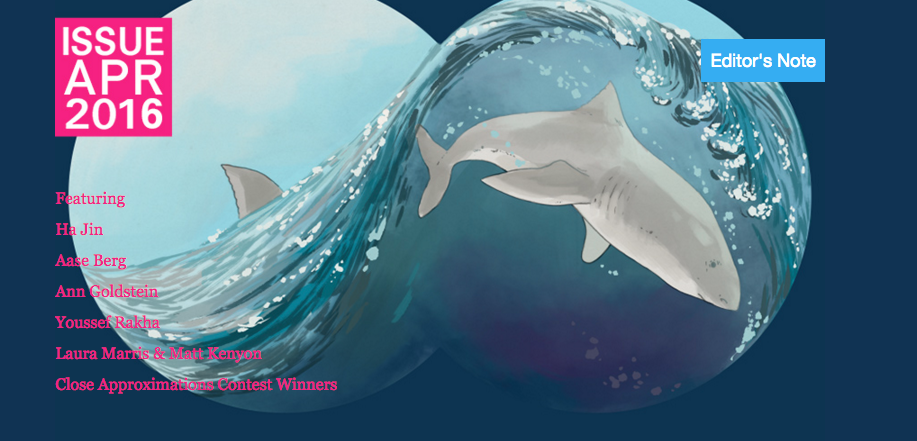Asymptote‘s latest issue hit the digital shelves on Friday, and there’s so much to read: in addition to featuring poems by the late Tomaž Šalamun and brand-new verse from Aase Berg’s Hackers, (translated from the Swedish by Johannes Göransson), you can read interviews with Ferrante/Levi translator Ann Goldstein and literary heavyweight/literary “improbability” Ha Jin. But it doesn’t end there: at long last, this issue features the winners of our Close Approximations contest, but among so many other “regular” journal offerings, it’s hard to know where to start. In true blog tradition, we’ve picked favorites from the latest release. The list, we insist, is by no means exhaustive; you really can’t go wrong at all—dig in!
Allegra Rosenbaum, blog editor:
From Venezianella the Futurist, by T. Marinetti, translated by Jennifer Scappettone from Italian
In this excerpt from the last major work of the infamous Futurist F.T. Marinetti, virtually no punctuation is used. The language is heavy with ugly progress. What’s more, the struggles of the protagonist Studentaccio, or Rottenstudent, feel even heavier. The reader witnesses Studentaccio wanders through a New Venice. It is in the midst of a civil war based not so loosely on the actual World War II happening at the time of this piece being written. Studentaccio wanders not only through war, but through different artistic time periods, using them to give the quality of a “fever-dream” as the translator Jennifer Scappettone calls it. Read this “aeropoem” closely, as there are gems of writing that only Marinetti could create.
They storm the wall of the opposite bank and the waxy muzzle of a rat generaless commands them like the little headlight of a car
There is a beautifully grotesque element to every word in the poem. Word after word gets the reader more and more lost and entrenched in the world of Studentaccio and the true world Marinetti is alluding to.
From Songs of Mexico, by Various Aztec Authors, translated by David Bowles from Nahuatl
The two poems translated by David Bowles have hundreds of emotions compounded into pure poetry. There is a definite sense of mortality, as these poems are about preparing for war. Mortality is juxtaposed with the idea of home, not only as the home we return to each day, but also the home of the afterlife. The language is rich with references to different gods of war, one of which also created the earth. I find it interesting that a god who creates earth is also a god of war. It seems that in these poems, war is not as much destruction as it is traditionally thought to be.
Look to the south
And east, the rising place
Of our Lord the Sun!
Let your soul take flight
Where battle spreads—
Deluge and conflagration.
There one seizes power,
Kingship, holy blooms.
Instead of pure destruction in a time of war, there is flight, there are flowers, and there is blooming. Instead of an end, war is a cycle, much like life.
Patty Nash, blog editor:
Interview with Ann Goldstein by Henry Ace Knight
I’ve written issue highlights for nearly three years, and by now, my recommendations might seem straightforward: I like weird and surprising poems, I like weird and surprising fiction (I like weird surprises—period). I think once, a few issues back, I recommended drama—what a shock—but my tastes, by now, should be relatively predictable. Thus the shock: I think the interview with Italian translator Ann Goldstein is so, so fascinating. It’s filled with the best kinds of details we cull from our translator profiles on the blog. And I think you should read it at once.
Goldstein talks seriously about Primo Levi in the first half of the interview—she’s translated his Complete works, an endeavor for which she received a Guggenheim grant—and then moves to talk about her idiosyncratic translatorial upbringing. Take, for instance, her first impressions of her famous writer, Elena Ferrante:
Did you have any particular interest in Ferrante or Levi before you translated them?
I didn’t even know about Ferrante.
Goldstein, a copyeditor at the New Yorker, came about Italian—and translation—by utter accident: she took night classes at the New Yorker so that she could reader Dante in Italian, then finished her first translation on a whim because she was the only one in the office to speak or read Italian. So it goes.
“The Cities” by Marie Silkeberg, translated by Kelsi Vanada and Marie Silkeberg
These poems won the Close Approximations prize for poetry, judged by Michael Hofmann—and how exciting to see them here. Full disclosure: as an MFA candidate at the University of Iowa, I worked with Marie and Kelsi in Iowa’s International Writing Program to workshop earlier versions of these as part of Marie’s residency in Iowa City. But Asymptote‘s staff is large, and I had no idea Kelsi and Marie were submitting for the contest—much less that they won. But I couldn’t be happier; in workshop in November, we at the table knew we had something great before us.
a test of the heart. the membranes. could come in the morning. sleep. a measure of freedom. somewhere dogs bark. in the night. anxiety like a contraction. dizziness in the body. a state of shock. kicks. kicks. against fetal membranes. the streetlight-lit greenery.
“The Cities” recalls Italo Calvino’s Invisible Cities in its specificity, its throbbing particularity of place and encounter. It is document of collaboration: collaboration between Marie Silkeberg and Palestinian poet Ghayath Almadhou, collaboration between Silkeberg and Vanada, and collaboration between the both destructive and constructive processes of city-building and commemoration. “The Cities” deftly mixes metaphor with image so stark it precludes the cognitive processes of metaphor:
reluctant dawn light. white church. white patterned synthetic curtains. stillness over the cobblestone streets. silent subway tunnels. despite the many people. breath like a cloud over her frozen fingers. pork fat. the taste. the smell. a strange perfume in the orange soap.
Go read it.

